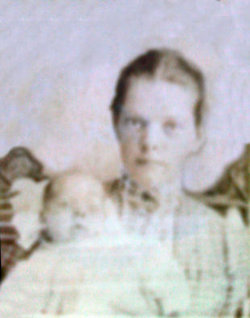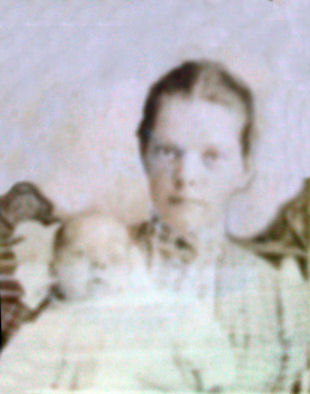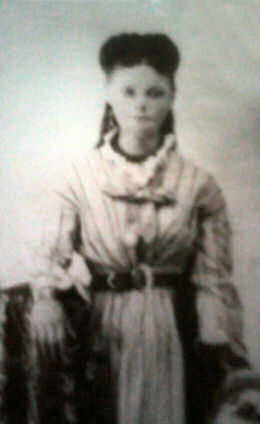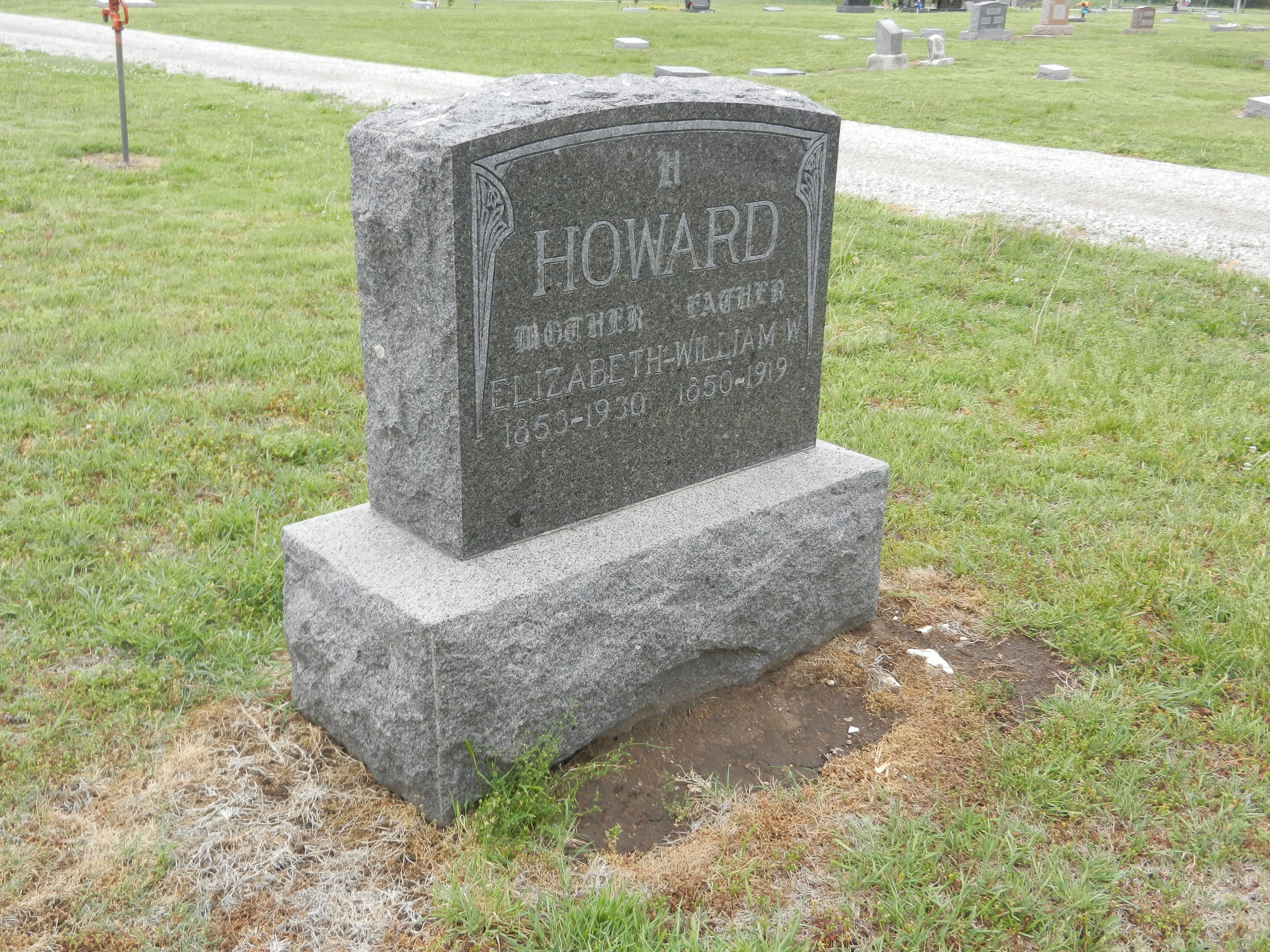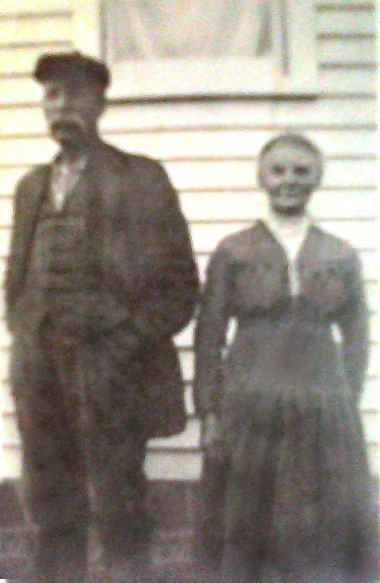Elizabeth's father was William H. Munford. Her mother was Henrietta Craddock. Henrietta was an invalid much of her life due to complications arising from giving birth to her children. Elizabeth Story Munford was the oldest of the Munford children and assumed most of household duties and child rearing duties for the family at a very early age.
Family history shared by Retta E. Howard, daughter of Elizabeth and William Howard:
"The next spring (1870) brought more hardship. An epidemic of a children's disease, known as "red sore eyes" spread through the countryside, and 16 year old Betty was one of the early victims. There was no doctor in any of the small towns nearby, and so, when a man, representing himself as a travelling doctor, came through the area, grandfather was glad to have him treat Betty's eyes. Unfortunately, the man knew little about medicine, used strong, poisonous solutions in her eyes, and caused total blindness. Several more children in the neighborhood were also blinded, and the "doctor" disappeared, just ahead of a posse.
For about six months Betty could not see at all. Things were not going too well in the home without her help and guidance, so grandfather decided that something must be done. He heard that there was a reliable doctor in Bethany, the county seat, so he and Betty made the 25 mile trip on horseback. The doctor proved to be an intelligent, experienced man, and was able to successfully treat her eyes, so that she gradually regained her sight, although her left eye caused her suffering the rest of her life.
This was long before colored glasses were invented. The doctor warned her that she must wear a green veil over her face every time she went out-of-doors. Betty was naturally shy and unused to the company of people her own age, and having to wear the green veil made her more reluctant to go out in their company, even when she had the opportunity. She discarded the veil after about a year, but still stayed close to home, both from preference and necessity. She was now definitely "mother" of the family."
_______________________________________________
"Always tiny, as the years went by, she became thinner and smaller. The heavy household tasks grew harder and harder for her to accomplish. As she neared her 24th birthday she moved around the house like a pale little ghost, and all through the winter she was scarcely able to supervise the younger children. Her father assured her that she would be better when spring came, but in February and March she drooped even more. Finally, alarmed by her condition, grandfather decided to take her back to the doctor in Bethany. After asking her father some very pertinent questions, the doctor suggested that Betty be sent somewhere on a visit, for a good, long rest, but there was nowhere she could go. The only alternative for her seemed to be marriage, as she must get away from the burdens and duties of her large family. Since she had been a 7-month baby, it was at that time believed (even by doctors) that she would never have children of her own, so in time she would recuperate if she were in a home of her own, with plenty of time to rest. The doctor's opinion was that she would not survive otherwise, and intimated that her father would be responsible.
This man-to-man talk gave grandfather plenty of food for thought. He truly loved his daughter, and certainly did not want to be the cause of her death. But finding her a husband---well, that could be a problem.
Because of grandmother's illness, and their rather isolated home, he knew no young people. The only young man in the vicinity was Will Howard who had recently come to work on the ranch. Grandfather knew very little about him, except that he had "come West" from Illinois, that he was a good worker, and seemed to have few bad habits. He had noticed Will trying to talk to Betty several times, but she had been too shy---or too busy--- to encourage him. This had pleased grandfather at the time, but now---well, he would have a talk with Will.
The ensuing conversation ended satisfactorily for both Will and Grandfather Munford. Will was ready to settle down, and was strongly attracted to Betty. There was a small tenant house on the Munford ranch, and grandfather agreed to furnish it for the young couple. Will could continue to work for him.
His next duty was to inform Betty of the arrangement, and grandfather went about it in his usual authoritative way. On the day after his talk with Will, he found Betty alone in the kitchen. Abruptly, he said, "Get your things together. You and Will are going to be married Sunday." Although stunned by this totally unexpected announcement, Betty didn't protest as her father's word was law. There wasn't even any place to go for a good cry, as there was no privacy in this large family. She had seldom spoken to Will, and had never really looked at him. He was a complete stranger, and she couldn't imagine being married to him. But there seemed to be no way out, so she made what preparations she could for the coming wedding. Her only consolation was that her two sisters, Nancy, 18, and Belle, 16, had already assumed most of the family burdens and tasks. They were rather dependent on her supervision, but she would still be near enough to help when needed.
Sunday, April 1, 1877, Betty and Will were married by Reverend Benjamin Miller of the United Brethren Church, with Betty's favorite uncle and aunt, Roland and Mariah Munford, as witnesses. The ceremony was probably held at the Munford home, because of the illness of Betty's mother. I have heard my father tease mother about having to go and find her (she had run out of the house soon after the ceremony) to get his first kiss."
Elizabeth's father was William H. Munford. Her mother was Henrietta Craddock. Henrietta was an invalid much of her life due to complications arising from giving birth to her children. Elizabeth Story Munford was the oldest of the Munford children and assumed most of household duties and child rearing duties for the family at a very early age.
Family history shared by Retta E. Howard, daughter of Elizabeth and William Howard:
"The next spring (1870) brought more hardship. An epidemic of a children's disease, known as "red sore eyes" spread through the countryside, and 16 year old Betty was one of the early victims. There was no doctor in any of the small towns nearby, and so, when a man, representing himself as a travelling doctor, came through the area, grandfather was glad to have him treat Betty's eyes. Unfortunately, the man knew little about medicine, used strong, poisonous solutions in her eyes, and caused total blindness. Several more children in the neighborhood were also blinded, and the "doctor" disappeared, just ahead of a posse.
For about six months Betty could not see at all. Things were not going too well in the home without her help and guidance, so grandfather decided that something must be done. He heard that there was a reliable doctor in Bethany, the county seat, so he and Betty made the 25 mile trip on horseback. The doctor proved to be an intelligent, experienced man, and was able to successfully treat her eyes, so that she gradually regained her sight, although her left eye caused her suffering the rest of her life.
This was long before colored glasses were invented. The doctor warned her that she must wear a green veil over her face every time she went out-of-doors. Betty was naturally shy and unused to the company of people her own age, and having to wear the green veil made her more reluctant to go out in their company, even when she had the opportunity. She discarded the veil after about a year, but still stayed close to home, both from preference and necessity. She was now definitely "mother" of the family."
_______________________________________________
"Always tiny, as the years went by, she became thinner and smaller. The heavy household tasks grew harder and harder for her to accomplish. As she neared her 24th birthday she moved around the house like a pale little ghost, and all through the winter she was scarcely able to supervise the younger children. Her father assured her that she would be better when spring came, but in February and March she drooped even more. Finally, alarmed by her condition, grandfather decided to take her back to the doctor in Bethany. After asking her father some very pertinent questions, the doctor suggested that Betty be sent somewhere on a visit, for a good, long rest, but there was nowhere she could go. The only alternative for her seemed to be marriage, as she must get away from the burdens and duties of her large family. Since she had been a 7-month baby, it was at that time believed (even by doctors) that she would never have children of her own, so in time she would recuperate if she were in a home of her own, with plenty of time to rest. The doctor's opinion was that she would not survive otherwise, and intimated that her father would be responsible.
This man-to-man talk gave grandfather plenty of food for thought. He truly loved his daughter, and certainly did not want to be the cause of her death. But finding her a husband---well, that could be a problem.
Because of grandmother's illness, and their rather isolated home, he knew no young people. The only young man in the vicinity was Will Howard who had recently come to work on the ranch. Grandfather knew very little about him, except that he had "come West" from Illinois, that he was a good worker, and seemed to have few bad habits. He had noticed Will trying to talk to Betty several times, but she had been too shy---or too busy--- to encourage him. This had pleased grandfather at the time, but now---well, he would have a talk with Will.
The ensuing conversation ended satisfactorily for both Will and Grandfather Munford. Will was ready to settle down, and was strongly attracted to Betty. There was a small tenant house on the Munford ranch, and grandfather agreed to furnish it for the young couple. Will could continue to work for him.
His next duty was to inform Betty of the arrangement, and grandfather went about it in his usual authoritative way. On the day after his talk with Will, he found Betty alone in the kitchen. Abruptly, he said, "Get your things together. You and Will are going to be married Sunday." Although stunned by this totally unexpected announcement, Betty didn't protest as her father's word was law. There wasn't even any place to go for a good cry, as there was no privacy in this large family. She had seldom spoken to Will, and had never really looked at him. He was a complete stranger, and she couldn't imagine being married to him. But there seemed to be no way out, so she made what preparations she could for the coming wedding. Her only consolation was that her two sisters, Nancy, 18, and Belle, 16, had already assumed most of the family burdens and tasks. They were rather dependent on her supervision, but she would still be near enough to help when needed.
Sunday, April 1, 1877, Betty and Will were married by Reverend Benjamin Miller of the United Brethren Church, with Betty's favorite uncle and aunt, Roland and Mariah Munford, as witnesses. The ceremony was probably held at the Munford home, because of the illness of Betty's mother. I have heard my father tease mother about having to go and find her (she had run out of the house soon after the ceremony) to get his first kiss."
